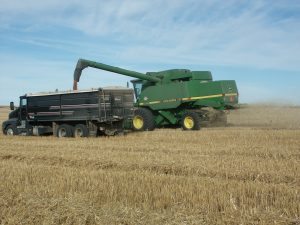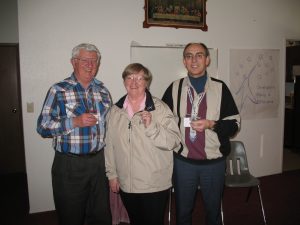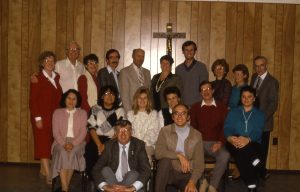Live Lives Worthy of the Gospel
(Isaiah 55:6-9; Psalm 145; Philippians 1:20-24, 27; Matthew 20:1-16)
**********************************************************
As a young man, Tom was a landscaper in Calgary. When asked by his uncle how many men he had working for him, he replied that he had one steady employee. However, because the nature of landscaping is such that some days, a team of workers is needed, he took advantage of a labor pool that the city of Calgary had at that time. He could make one phone call and get as many workers as needed from a pool of men who could not find full time work but were available, eager and happy to work for the day.

Unloading grain “on the go”
The readings today invite us to be like those men, available, eager, and happy to work for the Lord, and in doing so, live lives that are worthy of the Gospel.
The parable that Jesus tells in today’s gospel about the workers in the vineyard is difficult to understand and at first glance, seems unjust and unfair. After all, what employer in today’s society would ever pay a worker a full day’s wage if he or she had only worked one hour?
To understand the deeper meaning of this parable, and to “get” the lesson that Jesus is trying to teach us, we have to look at the parable more closely and study its implications more deeply.
St. Matthew tells us that men are “standing idle,” then that they are just “standing around,” and finally, “no one has hired us.” Just to hear these phrases is enough to dampen one’s spirit. They are a suggestion that understanding this parable involves a theology of work.
Over the ages, the Church has always esteemed labor as a source of respect, creativity, esteem and satisfaction. Popes have written encyclicals on the topic of labor. Work can be seen in itself as holy, a contribution to society – a much greater value than idleness.
The phrases “standing idle’”, “standing around,” and “no one has hired us,” are not very exciting or positive statements. They express a sense that lack of work and idleness is a source of boredom, a reality that kills the spirit of a person who wants to live a full life, a situation intolerable to some, demeaning to most. Those who had work were the fortunate ones. There was no need to envy those who came late. They were the ones who missed out on the day’s meaningful activity and had to put up with the boredom that inactivity involves, even if they were paid the same monetary sum.
There is a call to conversion here, to metanoia, to change our attitude towards work and inactivity, if we are to understand this parable and what Jesus is trying to teach us. An attitude is our basic way of seeing, feeling, thinking and acting in the world, and we need to change our attitude towards work.
The way the prophet Isaiah puts it in the first reading, we are to “forsake our ways and our thoughts, to return to God, to seek God, who will give forgiveness and pardon.” That pardon, he continues, can come to us at any time – even at the last minute. Fortunate are those who receive it early; who actually live the experience of forgiveness and intimacy with God throughout their whole lives, rather than just at the last day or hour of their lives.
St. Paul in the second reading to the Philippians states bluntly: “To live is Christ!” We are to be living in Christ, who is living in us. We are invited to be workers in the vineyard of the Lord. What an honor. What a privilege and blessing. What could be greater than that? And as workers in the vineyard, we are to live lives worthy of the gospel.

The young Therese
St. Therese of Lisieux is one who understood this gospel. A cloistered contemplative nun who never left her monastery, she had a heart that wanted to embrace the whole world. Trying to discern how she could do that, she finally intuited that she would be one who would be “love,” who would be love for the whole world in the heart of the Church. In the end, she, a cloistered young nun, became the patron of missions for the world.

St Therese of Lisieux
The way she lived out her vocation as a worker in the vineyard was to do the smallest thing with great love, and to love her sisters, even those most difficult to love, with all her heart, giving them the impression that they were the best of friends. She would be the first to feel pity for those who do not understand this, who think that doing their own will, living selfish lives, being lazy or deliberately unproductive is what life is all about. And she would be the first to rejoice when such a person finally would have a conversion experience, confess their wrongdoing, even on their deathbed, and come to the Lord.
Most priests, religious and pastoral workers in the Church get great meaning, fulfillment, satisfaction and even joy out of their ministry. They would find it difficult to give it up. In 1987, I teamed up with Ed and Angie Mihalicz of Beauval to form the Keewatin Renewal Team (KRT). That proved to be a priceless, joy-filled and fulfilling period of ministry for us. We toured the archdiocese putting on parish renewals, Search retreats for youth, and Christopher Leadership courses. The renewals involved a lot of singing, fellowship, laughter, scripture proclamation, talks, reflection questions, small and large group sharing, homework, and a ritual to close the evening.

Ed, Angie and + Sylvain with their lifetime Christopher pins
The sessions were dynamic, touched participants deeply, led to much renewal and personal and communal healing. The youth who participated in the retreats grew personally and experienced personal and family healing. And those who had leadership potential in their parishes benefited from the skills and confidence the leadership courses gave them.

Flin Flon, Manitoba CLC grads and team (including Fr.John Zunti OMI) 1987
We still look back on that experience as some of the best years of our lives. To have taken that ministry away from us and offered us no work at all, even with pay, would have been a debilitating deprivation for us. We truly felt like we were workers in the vineyard of the Lord, and quite confident we were living lives worthy of the Gospel.
The Eucharist is itself a “work” of the Spirit. It is called the liturgy of the Eucharist, liturgia, a Greek word that technically means, “work,” the work of the people.
The Eucharist is holy work, a work that involves all present, for all have a ministry within the celebration, whether it be presiding, reading, singing, serving, ushering, taking up the collection, playing an instrument, leading the choir, and above all, praying and worshipping with all our hearts.
May this celebration strengthen us to work in the Lord’s vineyard with joy, and above all, to live lives that are worthy of the Gospel.




Hello Bishop Lavoie, During the Charismatic Prayers/ Praise and Worship I had a vision about Mexico City with disasters, people dying and building collapsing. I was also shaking really strongly and badly on the floor while I was praying for the country and I knew the earthquake is not over yet, there might be another one coming along the way. I have to go the City and the Shrine Our Lady of Guadalupe Oct 9. I do not want to go there and I do not know what our church is going to do. Just pray for this matter since there are many people who join the pilgrimage and we are only there for one week. …… Thanks for teachings and messages today about the Vineyard and St. Therese of Lisieux is a good example …. Thanks again and God Bless You.